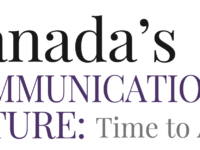Over the past several weeks, our world has been upended by Coronavirus or COVID-19 pandemic. Given the head-spinning changes taking place in our society, there is a widely recognized need for immediate open access to the latest research and medical developments. Yet despite the fact that the public often funds research in the area, the conventional publishing model often places that information behind paywalls or subscription fees. Heather Joseph, the Executive Director of SPARC, joins me on the podcast this week to discuss the response from publishers, funders and other stakeholders to the urgent need for access to COVID-19 research and what the response tells us about the issue of open access to scholarly research more broadly.
Post Tagged with: "lawbytespod"
The LawBytes Podcast, Episode 42: What Does the Canada-US-Mexico Trade Agreement Mean for Digital Policy?
The ratification of the Canada – US- Mexico Trade Agreement has captured considerable attention with several committees studying Bill C-4, the bill aimed at ratifying the deal. Over the past month, I’ve had the opportunity to appear before two of those committees – the House of Commons Standing Committee on International Trade and on Industry, Science and Technology – where I discussed the digital law and policy implications the agreement. This week’s podcast features excerpts from those appearances, including my opening statement and the ensuing discussion with several MPs on copyright term extension, cultural policy, and privacy.
The LawBytes Podcast, Episode 41: Nasma Ahmed With a Call for a Ban on Facial Recognition Technologies
Facial recognition technologies have attracted mounting attention in recent weeks led by a New York Times report on Clearview AI, soon followed by revelations of police use of the service in multiple Canadian cities. In fact, just after recording the interview for this podcast, there were revelations that the Clearview AI service has been used in Canada by an even wider array of police forces, retailers, insurance investigators, and others than previously imagined. In some instances, those organizations had denied using the service. There are now several privacy commissioner investigations into the situation.
To examine the concerns associated with facial recognition technologies and what we should do about it, I’m joined on the podcast this week by Nasma Ahmed, a technologist and community organizer that works within the intersections of social justice, technology and policy. She recently published an op-ed in the Globe and Mail with McGill’s Taylor Owen calling for a pause on the technology. Nasma is currently Director of the Digital Justice Lab, which is based in Toronto.
The LawBytes Podcast, Episode 40: “Copyright Term Extension is a Tax on Consumers” – Paul Heald on What Extending Copyright Term Could Mean for Canada
Copyright term extension has emerged as a major policy issue in Canada in recent months. Canada’s general copyright term is life of the author plus 50 years and successive governments have rejected lobbying pressure to extend by an additional 20 years. That changed with the new NAFTA, which includes a life plus 70 years requirement. Canada negotiated a 30 month transition period with no need to extend the copyright term during that time. The Canadian copyright review recommended that any extension include a registration requirement for the extra 20 years.
Paul Heald is a law professor at the University of Illinois, where he has led the world in conducting extensive empirical analysis on the effects of copyright term extension and the value of the public domain. His work has used some creative methods examining data on sites such as Amazon and Wikipedia to learn more about the effects of term extension. He joined me on the podcast to discuss his findings and new work he has been doing on the data in Canada.
The LawBytes Podcast, Episode 38: Debating the Broadcast Panel Report – A Conversation with BTLR Panel Chair Janet Yale
The release of the much-anticipated Broadcast and Telecommunications Legislative Review Panel report late last month sparked a torrent of discussion and debate. The 235 page report – often referred to as the BTLR or Yale Report – features 97 recommendations that covers telecom, broadcast, the future of the CBC, online harms, digital taxation, and a myriad of other issues. Janet Yale, the panel chair, joins the podcast this week to talk about the report. Our wide ranging conversation touches on the policy objectives of the panel, the news regulation concerns, net neutrality, consumer costs, and what may lie ahead for communications law reform.











